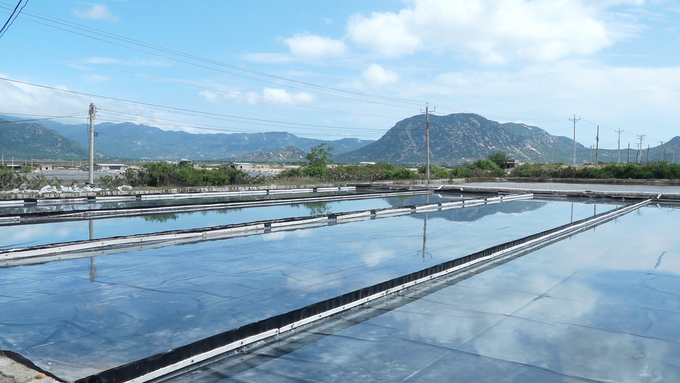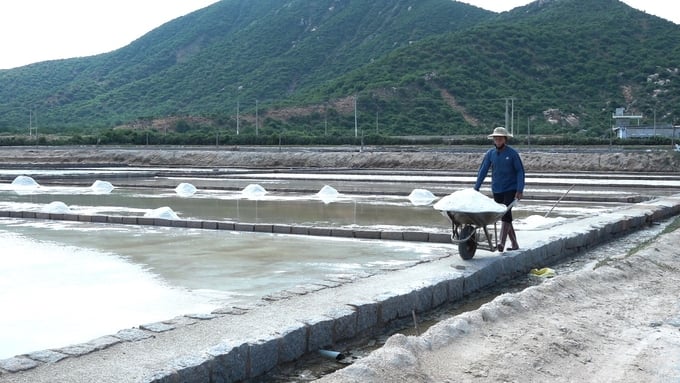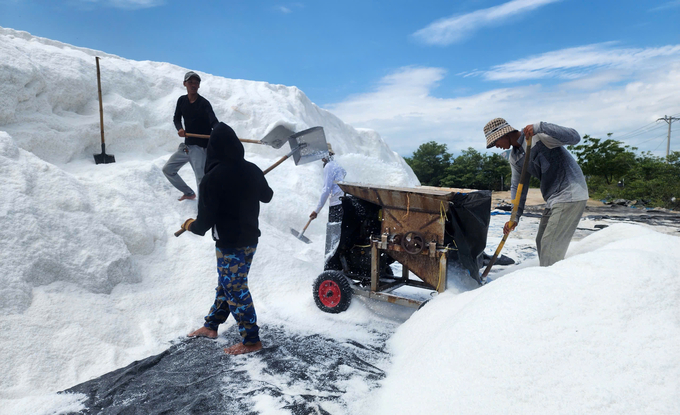June 25, 2025 | 19:20 GMT +7
June 25, 2025 | 19:20 GMT +7
Hotline: 0913.378.918
June 25, 2025 | 19:20 GMT +7
Hotline: 0913.378.918

Currently, Ninh Thuan province has implemented the use of tarpaulin-covered crystallization beds for salt production over an area of 250 hectares. Photo: PC.
Shifting to advanced production methods
Ninh Thuan province has a coastline of over 105 km, with clean seawater, high salinity, intense radiation energy, and year-round hot weather, which causes significant evaporation, creating favorable conditions for salt production.
According to the Department of Agriculture and Rural Development of Ninh Thuan, by the end of 2024, the province's salt production area reached 3,059 hectares, including 2,407 hectares for industrial salt and 652 hectares for traditional salt production. The total salt output reached over 446,000 tons, with industrial salt accounting for more than 246,000 tons, and the remainder coming from traditional salt farming.
Previously, the local salt production was done using traditional methods, where seawater was poured into fields to crystallize on the ground, resulting in salt with a high level of impurities and low quality.
To improve the quality of crystallized salt and increase productivity, since 2010, Ninh Thuan's agricultural sector has implemented a tarpaulin-covered salt production model, providing technical advice, guidance, and support for salt farmers to shift from traditional methods to the tarpaulin-based crystallization process.
Although the initial investment for tarpaulin salt production is high, the advantage is that the drying time is reduced to just 5 days per harvest. The quality of the salt is also improved due to the absence of impurities, and labor is saved by using machinery in certain stages of production and harvesting. Due to these advantages, many salt farmers in the province have invested hundreds of millions of VND to adopt this advanced model.

In 2024, the salt production industry in Ninh Thuan province created jobs for 2,960 workers. Photo: PC.
In recent years, businesses and salt farmers in Ninh Thuan province have made significant investments in expanding the area of salt production using tarpaulin-covered crystallization beds to improve productivity and product quality. At the same time, they have promoted the replication of clean salt production linkage models, establishing cooperatives and production groups to support salt farmers with the supply of materials and product consumption.
According to the Department of Agriculture and Rural Development of Ninh Thuan, the province has currently implemented the use of tarpaulin-covered crystallization beds over an area of 250 hectares. Of this, businesses use 180 hectares, while salt farmers cover 70 hectares. The application of scientific and technical advancements in salt production has increased productivity, reduced labor, improved salt quality, and alleviated difficulties, allowing salt farmers to feel more secure in their production activities.
Applying technological advancements
To ensure the sustainable development of salt production, Ninh Thuan is currently focusing on implementing the "Salt Industry Development Project for the 2021-2030 Period." As part of this, Ninh Thuan aims to become a key region for industrial-scale salt production in Central Vietnam, meeting the needs of the chemical industry and providing raw materials for high-end refined salt processing.
To achieve the goals of this project, Ninh Thuan targets maintaining the current salt production area of 3,059 hectares by 2025, with an output of over 500,000 tons per year. Of this, the area for crystallized salt production using tarpaulin-covered beds will exceed 250 hectares. By 2030, the total salt production area in the province is expected to reduce to 2,835 hectares.

Sản lượng muối Ninh Thuận năm 2024 đạt trên 446.000 tấn. Ảnh: PC.
According to Mr. Truong Khac Tri, Deputy Director of the Department of Agriculture and Rural Development of Ninh Thuan, to ensure the sustainable development of the salt industry, the agriculture sector will continue to coordinate with relevant departments and local authorities to improve salt production, enhance salt quality, and increase the income of salt farmers. Specifically, the implementation of the project "Enhancing the Value of Salt Production and Processing in Ninh Thuan Province for the 2021-2030 Period" will provide a foundation for investing in infrastructure to overcome difficulties and limit current challenges in the salt industry.
In addition, the production process will be reorganized, and salt fields will be replanned to improve production and processing capacity by promoting mechanization, transferring the application of scientific and technological advancements in salt production and processing. The development of linkages between cooperatives and enterprises in salt production and processing will be encouraged, and models for the preservation and development of traditional salt production linked to tourism will be established.
"We aim for traditional salt to develop through large-field linkages, with cooperatives playing a key role in providing common services to members to form a value chain from production and processing to consumption, helping salt farmers stabilize their output and achieve steady income," said Mr. Truong Khac Tri. He also mentioned that Ninh Thuan's development plan would focus on investing in infrastructure for industrial-scale salt production fields to meet the needs of the chemical industry and high-end refined salt processing.
Currently, the quality of Ninh Thuan's salt has been steadily improving as businesses and salt farmers in the province have adopted advanced scientific and technical methods in salt production. In addition, local authorities and departments have provided support and guidance for salt farmers to invest in clean salt production, aiming to improve salt quality and ensure higher efficiency.
For industrial salt production, businesses have applied new technologies such as covering fields with tarpaulins to protect from rain, spreading tarpaulins on crystallization beds, using machines for salt collection, conducting long-term salt crystallization, and investing in salt washing lines after harvesting to meet quality requirements. Moreover, high-quality industrial salt processing plants have been invested in.
In 2024, the salt production industry in Ninh Thuan has created jobs for 2,960 workers, with 637 households involved in salt production. With prices ranging from 800 to 1,200 VND/kg for traditional salt and 1,200 to 1,400 VND/kg for industrial salt, along with support from local authorities and guidance on new salt production techniques, many salt farmers have a stable income and feel secure in continuing their work in salt production for the long term.
Translated by Kieu Chi
/2025/06/17/3942-2-143243_548.jpg)
(VAN) Recently, in Sweden, the Secretary of the Binh Dinh Provincial Party Committee presented the Investment Registration Certificate for the 'Polyester Fabric Recycling Complex' project to SYRE Impact-AB Company.
/2025/06/12/3721-2-202745_83.jpg)
(VAN) TH made an impression at Seoul Food 2025 with its line of natural beverages, paving the way for Vietnamese food products to enter the South Korean market.

(VAN) Soc Trang's success in rice exports stems from a strategy of developing fragrant and specialty rice cultivation areas and standardizing production toward low-emission practices.
/2025/06/11/1311-5-120811_839.jpg)
(VAN) The pig farming industry is facing the challenge of comprehensive restructuring to meet requirements for quality, safety, traceability, and market expansion both domestically and for export.

(VAN) Vietnam considers participating in ALGROALBA in order to expand agricultural production, coordinate the assessment and effective exploitation potential land.
/2025/06/05/5314-1-184727_407.jpg)
(VAN) From seemingly worthless fish scales and skin, enzymes and lactic ferments can transform by-products into peptides, opening a sustainable, effective business direction and elevating Vietnamese seafood.

(VAN) TTC AgriS and IFC signed a strategic partnership to develop a sustainable agricultural value chain, aiming to achieve the Net Zero target by 2035.